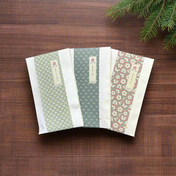A belated happy new year to you! I hope 2023 has started off kindly for you.
Today, January 20th in Japan marks Daikan (大寒;daikan), the season of the big cold and is described as the coldest time of the year. Daikan generally covers a period between January 20th - February 3rd, the last period of the 24 major divisions of the traditional Japanese calendar. After this period, comes the long awaited springtime…
Shifting gears a bit, I write today with the intention to touch on a famous Japanese proverb, “ichigo-ichie”. Having spent more years abroad, only a few Japanese proverbs have stuck with me over the years and ichigo-ichie happens to be one of them. It actually takes me by surprise that I have yet to write about this proverb on Yunomi as it holds roots in the Japanese tea ceremony. Well, here’s my opportunity!
Ichigo-ichie, written with kanji characters as 「一期一会」 means “one time, one meeting” and captures the notion that we live each moment only once. So, how does this proverb relate to tea?
Its history dates back to 16th century Japan, to Sen no Rikyu’s times of the Japanese tea ceremony, where one was asked to be present at each moment of tea drinking. The participants came to a tea ceremony with the understanding the moment encapsulated within the ceremony would never re-occur. The proverb is said to have been further emphasized by a tea master named Ii Naosuke (1815 - 1860) in the mid-19th century. The story goes that he was constantly threatened with assassination and therefore made tea each day as if it were his last. In this way, he said the tea was unique and more beautiful than ever before...
 A beautiful and one and only cup of tea with the Japanese side-handled kyusu; Photo by Sueyoshi Tea Atelier.
A beautiful and one and only cup of tea with the Japanese side-handled kyusu; Photo by Sueyoshi Tea Atelier.
This approach of mindfully drinking a cup of tea reminds me of Vietnamese monk Thich Nhat Hanh (Thay)’s teachings and/or ways of being, embracing the impermanence of life (1). Many people have quoted Thay’s way in mindfully enjoying a cup of tea:
“Drink your tea slowly and reverently, as if it is the axis on which the world earth revolves – slowly, evenly, without rushing toward the future; Live the actual moment. Only this moment is life.”
Back when I was a graduate student, Thay’s teachings greatly impacted me as I felt I was always needing to be “doing” something instead of “being”. I remember how listening to these words by Thay gave me a sense of comfort as I was tried to sip some of my worries away!
“To be mindful is to be fully present with whatever we are doing. If you are drinking your tea, just drink your tea. Do not drink your worries, your projects, your regrets. When you hold your cup, you may like to breathe in, to bring your mind back to your body, stop your thinking, and become fully present. In that moment, you become real and the cup of tea becomes real. In this state of true presence and freedom you enjoy simply drinking your tea.”
If you are familiar with Thich Nhat Hanh’s teachings, Buddhism, and/or with mindfulness, the Japanese proverb “ichigo ichie” may feel quite familiar to you. In Japan, nowadays, ichigo ichie is not specific to the context of the tea ceremony and is generally utilized to refer especially to encounters happening uniquely only once in a lifetime, even with people you meet regularly as every encounter with them is unique to that moment. As a fun fact it was also the Japanese title given to the famous American film, “Forest Gump”.
As human beings, we have the ability to dwell in the past or think ahead to the future. Perhaps, you have heard about the famous research study led by Killingsworth and colleagues which demonstrated we spend approximately 46% of our time mind-wandering, ruminating with negative thoughts (2). So, while it takes continuous practice to live fully in the present moment, I hope that in this new year, you may have many delightful “ichigo-ichie” moments with your tea. That is, time and space to really appreciate your cup of tea! And perhaps, this approach/practice of fully being present with your teas will naturally spread to your encounters with people, animals, plants and beyond… !
 A memorable ichigo-ichie meeting with a cup of tea. Sometimes, for me, the best cups of tea are had in the mountains while backpacking!
A memorable ichigo-ichie meeting with a cup of tea. Sometimes, for me, the best cups of tea are had in the mountains while backpacking!
References:
- The Way Out Is In: Are You Truly There for Your Cup of Tea? Practical Ways to Slow Down
- Killingsworth, M. A., & Gilbert, D. T. (2010). A Wandering Mind is an Unhappy Mind Science, 330(6006), 932-932.
Featured image: Frosty New Year Greetings at the Tea Farm; Photo by Kajihara Tea Garden.


